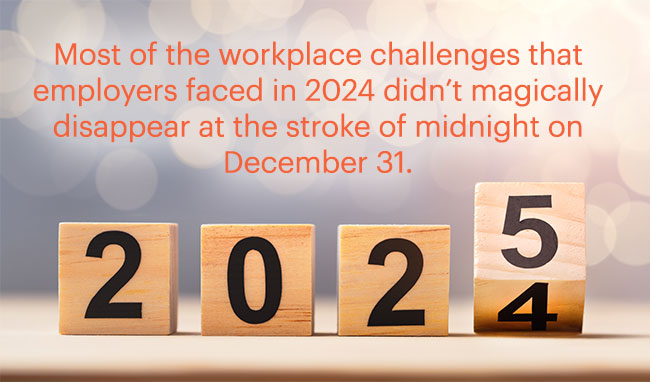HR Trends for 2025
By Mary Lynn Fayoumi, CAE, SPHR, SHRM-SCP, President & CEO
Published January 7, 2025
Happy New Year! Just like that a new chapter begins. Unfortunately, most of the workplace challenges that employers faced in 2024 didn’t magically disappear at the stroke of midnight on December 31. In fact, some of the pressing issues from the last few years have the potential to become even more pervasive in the months ahead. Here are several trends to be aware of as we embark on 2025.

Employee Retention. Surveys continue to show that the number of employees actually changing jobs is much lower than the number who report actively seeking other employment. This points to a serious concern related to workers who are no longer engaged in their current roles but aren’t making a job change. Gallup has coined a new term for this phenomenon: The Great Detachment. In short, people may be on your payroll but not making significant contributions to your organization’s success. Tackling this challenge will require leaders to determine what steps should be taken to rebuild employee commitment. A concerted effort to make meaningful organizational changes should result in a commensurate improvement in morale and performance.
Artificial Intelligence (AI). Although initial widespread fear about AI leading to a mass elimination of jobs has mostly subsided, employers still have plenty of AI-related issues to contend with. With employees often left in the dark about how exactly they can harness AI on the job, employers need to take a more active role in providing clear direction, guidelines, and support so that employees understand the rewards and risks of using AI to boost productivity and streamline processes. HR can set the tone by suggesting policies, experimenting with AI tools, and offering forums where employees can share use cases and cautionary tales.
Team Collaboration. Remote and hybrid work has been commonplace for almost five years now, but employers are still grappling with how often teams should meet in person and how to make the most of their time together. Dictating that all employees return to the office full time, five days a week has proven ineffective and even risky for many employers, causing them to lose talent and negatively impact their bottom lines. Yet, expecting team collaboration to “auto-magically” happen usually leads to frustration and disappointment. Open lines of direct communication on a regular basis are essential to collaboration no matter where employees are working and how often they come to the office. Managers may need additional training and HR support to bolster their skills at managing hybrid and remote teams.
Well-being. Note that I didn’t use the term “employee well-being,” because this challenge is more pervasive. It applies to everyone who has an impact on our workplaces, from our employees, to their family members and friends, to our customers and business partners, to our local communities and beyond. Whether well-being is impacted by physical or mental health issues, financial stressors, or catastrophic events, there is a ripple effect which manifests in workplaces through absenteeism, presenteeism, and turnover. Employers must remain vigilant to ensure that employees feel well supported by offering policies and benefits in tandem with empathetic leadership and management to promote well-being for all.
Addressing these and other HR challenges in 2025 will require considerable effort and significant resources. HR Source will continue to keep employers abreast of what’s happening and how it will impact the workplace. If you need our guidance or services, we’re just an email or call away (800-448-4584).
What trend will be most important to your organization in 2025? Share what’s on your priority list in the All Members Community on HR Exchange.